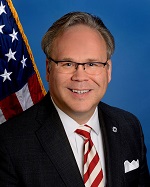 NCUA official seal. (Source: NCUA)
NCUA official seal. (Source: NCUA)
More than a year into the pandemic, onsite credit union operations are set to resume for some of the NCUA staff.
In a letter from NCUA Chairman Todd Harper to all federally-insured credit unions Wednesday, he stated, "The agency is prepared to move into its first phase of resuming onsite operations (Phase 1) in some areas of the country." This decision came after meeting with the NCUA's public heath consultant and looking at the current state of the COVID-19 pandemic.
Recommended For You
According to the letter, as part of Phase 1, NCUA staff and contractors will be permitted to volunteer to work onsite at credit unions beginning July 19. "During Phase 1, staff may only volunteer to work onsite in locations where public health data indicates pandemic conditions have sufficiently moderated," the letter stated.
Harper went on to write, "To the extent they exceed the NCUA's safety protocols for Phase 1, NCUA staff working onsite in credit unions will generally be expected to follow credit union policies related to safety and security.
 Todd Harper (Source: NCUA)
Todd Harper (Source: NCUA) "To the extent possible, the NCUA will respect a credit union's preference to not have examination staff onsite during this phase. However, the NCUA reserves the right to conduct onsite work at a credit union if necessary to address a serious and time-sensitive matter."
Harper wrote, "The NCUA will also continue to maintain heightened safeguards in the agency's facilities to ensure the health and safety of staff and any visitors. The health, safety and well-being of its staff and credit union employees remains a top priority for the NCUA. The agency will continue to monitor the course of the pandemic and adjust its plans as necessary to ensure staff safety, while continuing to ensure the safety and soundness of the credit union system and protect credit union members."
The letter stated that the agency would notify credit unions of any changes in the phased-in protocols, including examination procedures.
The letter did not indicate what the other phases are or when they'd be put into place.
© Touchpoint Markets, All Rights Reserved. Request academic re-use from www.copyright.com. All other uses, submit a request to [email protected]. For more inforrmation visit Asset & Logo Licensing.







